Members of the Transitional National Legislative Assembly (TNLA) have vetoed the proposed increase in fees for obtaining nationality identity cards and passports, arguing that common citizens cannot afford it due to the prevailing harsh economic conditions.
They highlighted that civil servants and the organized have not received salaries for nearly 12 months now.
South Sudan currently charges SSP 30,000 for a nationality card, and USD 100 for a regular (ordinary) passport while official and diplomatic passports cost USD 200 respectively.
However, in the 2024/2025 fiscal budget, the finance ministry and National Revenue Authority proposed an increment that would see the fees for a regular passport shoot up to USD 150 and a diplomatic passport to USD 250.
Reacting to proposed increments, Nyayang Lok Riak, an SPLM Party lawmaker, insisted that the increments be quashed.
“Where do our citizens get dollars to get their passports? The immigration department proposed that the adult passport costs USD 150 yet it was USD 100 last financial year,” she said. “Suddenly it has increased to USD 150. Does it mean every year we will add something (fees) to our passport? We need to stick to what has been there, so, it should remain at USD 100 as it is.”
According to Lok, neighboring countries like Kenya and others in the region only charge their citizens USD 70 for ordinary passports.
The lawmaker urged the government to pay for the diplomatic passports for the parliamentarians and charged that it is unfair for the government not to pay civil servants and then charge the latter exorbitant passport and nationality identity card fees.
Her sentiments were seconded by Speaker Jemma Nunu Kumba who called for reforms in the immigration department. She also questioned the practice of alien registration of foreigners, especially citizens from the East Africa region.
“The concerned ministry (interior) should take note of that because now as a member of the East Africa Community, we need to align our policies with the region, with the community. If there are things that we do here that do not exist in those countries, I do not see why we should have them,” she said. “There is even what they call alien registration. When a foreigner comes here from East Africa, you have to register as an alien. I don’t understand it. When we go to Kenya or Uganda, for example, when you get there and have a visa, I don’t think you have ever been asked to register in another immigration office again.”
Responding to the matter, Interior Minister Angelina Teny distanced her ministry from the proposed charges which she said were originated by the non-oil revenue collecting institutions such as the National Revenue Authority and the Ministry of Finance.




